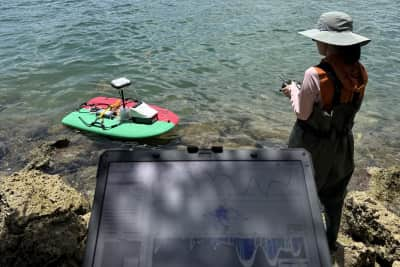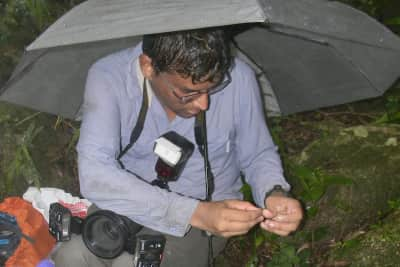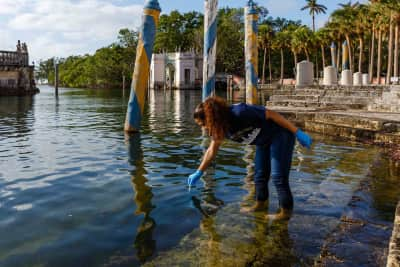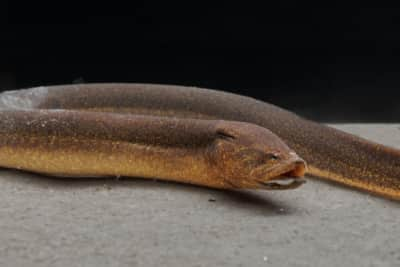FIU is committed to delivering the science for effective restoration and policy for the Florida Everglades. Our diverse expertise and leadership has helped guide restoration for more than four decades. Located on the edge of Everglades National Park and with more than 100 researchers focused on the Everglades, FIU is helping to create an inspiring and sustainable future for this environmentally and economically important ecosystem.
Experts
FIU researchers have spent more than three decades guiding the management, restoration and protection of water resources. On Dec. 11, 2025 it’ll be 25 years since Congress passed the Comprehensive Everglades Restoration Plan to restore, protect and preserve South Florida’s ecosystem while providing for water-related needs of the region.
Browse our Everglades experts available to discuss the health of the Everglades and plans for restoration or contact us for media relations assistance.
Featured Stories
FIU gets $6.375 million renewal from NSF for Everglades research
The six-year renewal is the fifth in the program’s history, which has been conducted in lock-step with the congressionally authorized Comprehensive Everglades Restoration Plan since that was first initiated 25 years ago. In addition to the long-term research that will continue, the program will expand its focus to integrate more community voices into the research, including the Miccosukee Tribe of Indians of Florida, farmers, economists, business leaders and policymakers, according to John Kominoski, principal investigator of the FCE-LTER and researcher in the FIU Institute of Environment.
Spread of invasive swamp eels poses new risk to Everglades
In Taylor Slough, once teeming with crayfish and small fish, silence has replaced abundance – and FIU biologists have found the culprit: swamp eels. First detected in South Florida in the early 2000s, these snake-like invaders from Southeast Asia have taken hold of the Everglades, devouring the same prey wading birds depend on. Their spread has disrupted the food web and threatens ongoing Everglades restoration efforts. FIU ecologist Nathan Dor, who has tracked the ecosystem for nearly two decades, discovered an alarming 80 percent loss of crayfish and small fish in Taylor Slough – evidence of the eels' groving impact on one of the Everglades' key feeding grounds.
Not in the mood: Mercury messes with songbirds' mating game
Before they can fight to survive, some endangered songbirds are losing their groove and being robbed of their chance at love – all because of what's in their food. Residing exclusively in Everglades National Park and Big Cypress National Preserve, the Cape Sable seaside sparrow has been endangered for nearly 60 years. Today, less than 2,500 remain. FIU doctoral candidate Alan Mock and a team of researchers now have growing concerns about a hidden threat lurking in the bird's food supply – mercury. Their latest research, published in Ecotoxicology, suggests male sparrows that have higher rates of mercury have significantly lower chances of scoring a mate – a major problem for a bird already struggling to survive amid habitat loss and degradation. This is the first research published on mercury concentrations in the Cape Sable seaside sparrow, Mock said.
Mangroves need Everglades restoration now more than ever
Sea level rise is outpacing South Florida’s coastal wetlands, according to a new FIU study. That means the iconic twisted and long-legged roots of South Florida’s mangroves could be drowned by rapidly rising seas by the end of the century. National Oceanic and Atmospheric Administration (NOAA) data shows in the last 20 years, the average rate of sea level rise in South Florida has accelerated faster than previously thought, increasing from 6.5 mm to 9.4 mm a year, compared with the historical rate of 3.9 mm a year. Without mitigation efforts, open water could replace the areas where mangrove forests currently reside. The new projections are a clear sign mangroves are in need of urgent help. But there is also a clear, actionable solution according to the researchers. The study says the Comprehensive Everglades Restoration Plan (CERP) is the best chance for a resilient future for both the mangroves and the entire Everglades ecosystem.
Read why mangroves need Everglades restoration now more than ever
News

Do you know anoles? They’re having a moment
Nov 4, 2025
Oceanographer provides rare scientific look at effects of storms on Biscayne Bay
Nov 3, 2025
"Forever chemicals" found for first time in Miccosukee Indian Reservation
Oct 16, 2025
Botanist on quest to identify and name endangered orchids
Oct 13, 2025
FIU calls upon citizen scientists to help collect data during King Tide
Oct 1, 2025
Spread of invasive swamp eels poses new risks to Everglades
Sep 29, 2025
Contact Us
JoAnn C. Adkins
Director of Marketing & Communications
305-348-0398
jadkins@fiu.edu
CASE 456Christine Fernandez
Senior Account Manager
305-348-9987
chcalvo@fiu.edu
CASE 456

